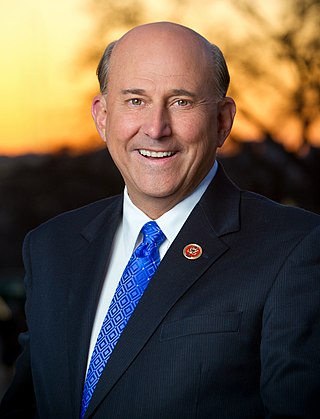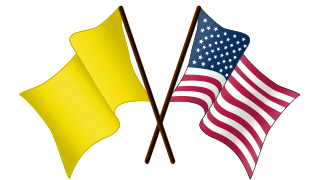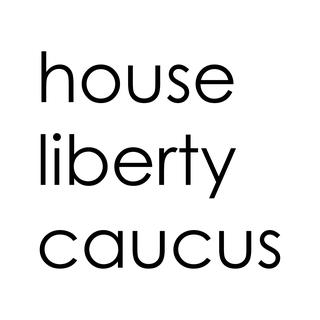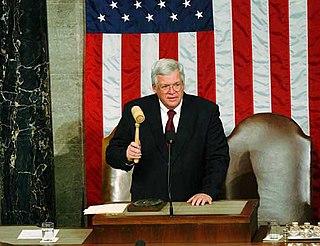
The speaker of the United States House of Representatives, commonly known as the speaker of the House or House speaker, is the presiding officer of the United States House of Representatives. The office was established in 1789 by Article I, Section II, of the U.S. Constitution. By custom and House rules, the speaker is the political and parliamentary leader of the House and is simultaneously its presiding officer, de facto leader of the body's majority party, and the institution's administrative head. Speakers also perform various other administrative and procedural functions. Given these several roles and responsibilities, the speaker usually does not personally preside over debates—that duty is instead delegated to members of the House from the majority party—nor regularly participate in floor debates.

Robert William Goodlatte is an American politician, attorney, and lobbyist who served in the United States House of Representatives representing Virginia's 6th congressional district for 13 terms. A Republican, he was also the Chair of the House Judiciary Committee, which has jurisdiction over legislation affecting the federal courts, administrative agencies, and federal law enforcement entities. Goodlatte's district covered Roanoke and also included Lexington, Lynchburg, Harrisonburg, and Staunton.

John Andrew Boehner is an American retired politician who served as the 53rd speaker of the United States House of Representatives from 2011 to 2015. A member of the Republican Party, he served 13 terms as the U.S. representative for Ohio's 8th congressional district from 1991 to 2015. The district included several rural and suburban areas near Cincinnati and Dayton.

Louis Buller Gohmert Jr. is an American attorney, politician, and former judge who was the U.S. representative from Texas's 1st congressional district from 2005 to 2023. Gohmert is a Republican and was part of the Tea Party movement. In January 2015, he unsuccessfully challenged John Boehner for Speaker of the House of Representatives. In November 2021, he announced his candidacy in the 2022 Texas Attorney General election. He failed to advance to the Republican primary runoff, finishing fourth with 17% of the vote. His political positions are often considered far-right.

In American politics, a Libertarian Republican is a politician or Republican Party member who has advocated libertarian policies while typically voting for and being involved with the Republican Party.

The House Liberty Caucus is a congressional caucus consisting of conservative, libertarian, and libertarian conservative members of the United States House of Representatives.

Timothy Alan Huelskamp is an American politician who was the U.S. representative for Kansas's 1st congressional district from 2011 to 2017. A member of the Republican Party, prior to entering Congress Huelskamp represented the 38th district of the Kansas Senate from 1997 until 2011.

Justin A. Amash is an American lawyer and politician who served as the U.S. representative for Michigan's 3rd congressional district from 2011 to 2021. He was the second Palestinian American and Syrian American member of Congress. Originally a Republican, Amash became an independent in 2019. He joined the Libertarian Party the following year, leaving Congress in January 2021 as the only Libertarian to serve in Congress. Amash returned to the Republican Party in 2024.

Theodore Scott Yoho is an American politician, veterinarian, and businessman, who served as the U.S. representative from Florida's 3rd congressional district from 2013 until 2021. He is a member of the Republican Party.

The Hastert rule, also known as the "majority of the majority" rule, is an informal governing principle used in the United States by Republican Speakers of the House of Representatives since the mid-1990s to maintain their speakerships and limit the power of the minority party to bring bills up for a vote on the floor of the House. Under the doctrine, the speaker will not allow a floor vote on a bill unless a majority of the majority party supports the bill.

The Freedom Caucus, also known as the House Freedom Caucus, is a congressional caucus consisting of Republican members of the United States House of Representatives. It is generally considered to be the most conservative bloc within the chamber. The caucus was formed in January 2015 by a group of conservatives and Tea Party movement members, with the aim of pushing the Republican leadership to the right. Its first chairman, Jim Jordan, described the caucus as a "smaller, more cohesive, more agile and more active" group of conservative representatives.
On October 29, 2015, during the 114th United States Congress, an election for speaker of the U.S. House of Representatives was necessitated by the impending resignation of John Boehner, set for October 30. Boehner was the first speaker to resign in the middle of a Congressional term since Jim Wright in 1989.
A motion to vacate the chair or motion to declare the chair vacant, commonly shortened to motion to vacate, is a procedure in which a member of a legislative body proposes that the presiding officer vacates their office.
On January 3, 2017, the first day of the 115th United States Congress and two months after the 2016 U.S. House elections, the incoming members of the U.S. House of Representatives held an election for speaker of the U.S. House of Representatives. This was the 125th U.S. speaker election since the office was created in 1789.
The Second Amendment Caucus, also known as the House Second Amendment Caucus, is a congressional caucus consisting of conservative and libertarian Republican members of the United States House of Representatives who support Second Amendment rights.
On January 3, 2019, the first day of the 116th United States Congress and two months after the 2018 U.S. House elections, the incoming members of the U.S. House of Representatives held an election for speaker of the U.S. House of Representatives. This was the 126th U.S. speaker election since the office was created in 1789.
On January 3, 2021, the 1st day of the 117th Congress and 2 months after the 2020 U.S. House elections, the incoming members of the U.S. House of Representatives held an election for speaker of the U.S. House of Representatives. It was the 127th U.S. speaker election since the office was created in 1789.
At the opening of the 118th United States Congress, the members-elect of the House of Representatives elected in the 2022 midterms held an election for its speaker, marking the 128th speaker election since the office was created in 1789. It began on January 3, 2023, and concluded in the early morning hours of January 7 when Kevin McCarthy of California, leader of the House Republican Conference, won a majority of votes cast on the fifteenth ballot. After the longest speaker election since December 1859 – February 1860, McCarthy won the speakership by making concessions to Republican Party hardliners, who had refused to support him through several rounds of voting, finding him too weak and untrustworthy.
On January 5, 2011, the first convening of the United States House of Representatives during the 112th United States Congress, and two months after the 2010 U.S. House elections, the incoming House members held an election for its speaker. This was 121st speaker election since the office was created in 1789. Since House Republicans had gained the previously-Democrat-held majority in the 2010 elections, Republican House Leader John Boehner unseated Democratic House Leader Nancy Pelosi as speaker.
















